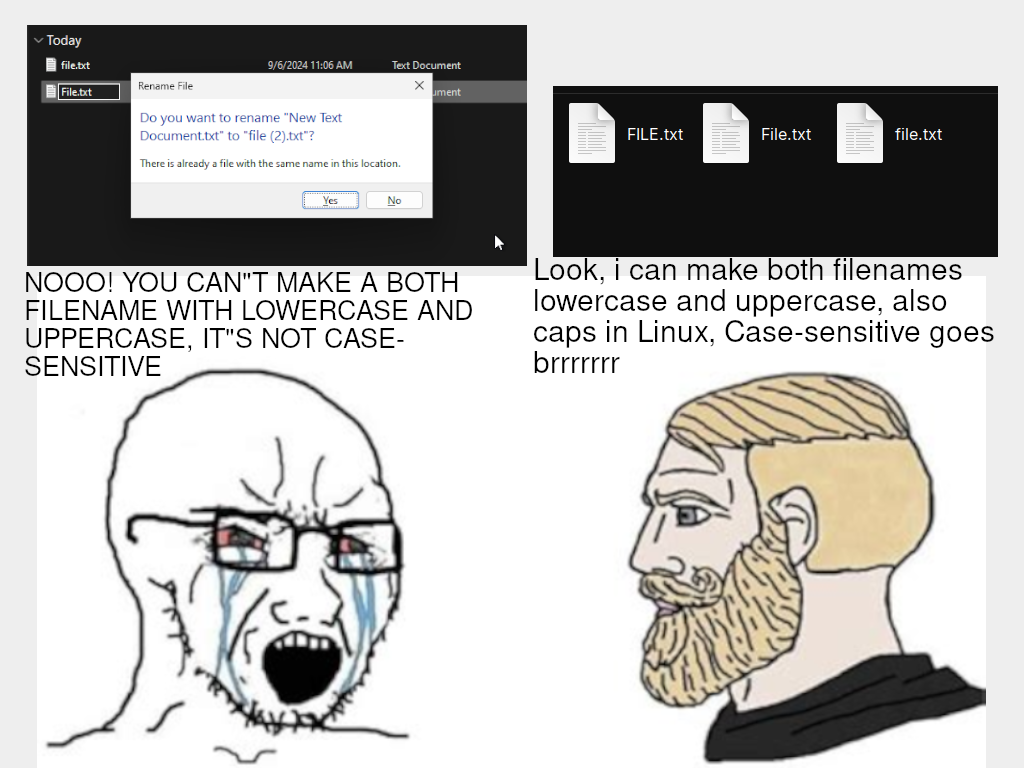this post was submitted on 06 Sep 2024
615 points (90.6% liked)
linuxmemes
21699 readers
2084 users here now
Hint: :q!
Sister communities:
Community rules (click to expand)
1. Follow the site-wide rules
- Instance-wide TOS: https://legal.lemmy.world/tos/
- Lemmy code of conduct: https://join-lemmy.org/docs/code_of_conduct.html
2. Be civil
- Understand the difference between a joke and an insult.
- Do not harrass or attack members of the community for any reason.
- Leave remarks of "peasantry" to the PCMR community. If you dislike an OS/service/application, attack the thing you dislike, not the individuals who use it. Some people may not have a choice.
- Bigotry will not be tolerated.
- These rules are somewhat loosened when the subject is a public figure. Still, do not attack their person or incite harrassment.
3. Post Linux-related content
- Including Unix and BSD.
- Non-Linux content is acceptable as long as it makes a reference to Linux. For example, the poorly made mockery of
sudoin Windows. - No porn. Even if you watch it on a Linux machine.
4. No recent reposts
- Everybody uses Arch btw, can't quit Vim, <loves/tolerates/hates> systemd, and wants to interject for a moment. You can stop now.
Please report posts and comments that break these rules!
Important: never execute code or follow advice that you don't understand or can't verify, especially here. The word of the day is credibility. This is a meme community -- even the most helpful comments might just be shitposts that can damage your system. Be aware, be smart, don't fork-bomb your computer.
founded 2 years ago
MODERATORS
you are viewing a single comment's thread
view the rest of the comments
view the rest of the comments

Imagine a table in a database where the primary key is a case sensitive character field, because you know varchars, just like C char types and string types in other languages are case sensitive.
Imagine a database administrator does the following:
Imagine a second database adminstrator around the same time does the following:
Now imagine this is the GDPR data of two different users.
If you have a case insensitive file system, you've just overwritten something you shouldn't have and possibly even leaked confidential data.
If you have a case sensitive file system you don't have to account for this scenario. If the PK is unique, the filename will be unique, end of story.
If you don't do something stupid like reuse keys just with different capitalization, this never occurs.
The point is you have to take this into account, so the decision to go with a case insensitive file system has ripple effects much further down your system. You have to design around it at every step in code where a string variable results in a file being written to or read from.
It's much more elegant if you can simply assume that a particular string will 1-on-1 match with a unique filename.
Even Microsoft understands this btw, their Azure Blob Storage system is case sensitive. The only reason NTFS isn't (by default) is because of legacy. It had to be compatible with all uppercase 8.3 filenames from DOS/FAT16.